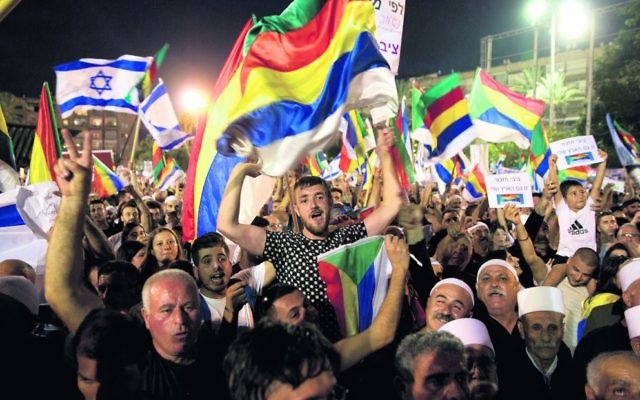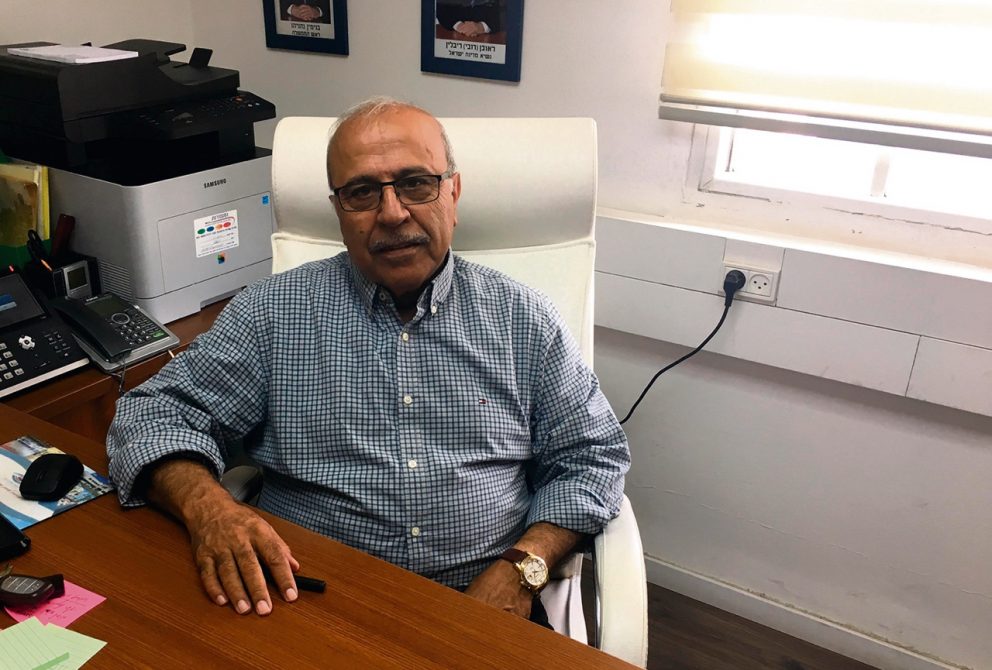Israeli Druze rally against ‘slap in face’ law
The relationship between Israel and its most loyal minority is in crisis, after it assembled a mass demonstration to decry the government's path.

THE relationship between Israel and its most loyal minority is in crisis, after it assembled a mass demonstration to decry the government’s path.
For decades, Israel’s leaders have considered the Druze community to be the model minority. While culturally closest to Arabs, they take a different path to most Arabs, serving in the IDF and advocating allegiance to the Jewish state.
But suddenly the Druze are seething, and claiming that with its latest political moves, the government has repaid their loyalty with insults.
“Despite our utter loyalty, the state does not see us as equal,” declared the community’s religious leader, Sheikh Muwafaq Tarif, in a speech at the Saturday night demonstration in Tel Aviv.
The anger continued after the demonstration, where tens of thousands of Jews joined much of the 120,000-strong Druze community.
“I didn’t think things would ever come to this,” said Amal Abu Salah, a 42-year-old photographer, on Monday.
He was talking to The AJN in Israel’s largest Druze town, Daliyat El Karmel near Haifa, where Druze flags flutter alongside Israeli flags, and where virtually every man you meet is happy to give you a rundown of his military service.
“This was a slap in the face of the government,” commented Elie Rekhess, an expert on Israeli minorities and visiting scholar at Northwestern University. He added, “I’m a historian, and from my perspective what we have seen may mark a turning point or a watershed.”
The fury of the Druze was sparked by the passing of the new Nation State Law. This legislation defines what it means for Israel to be a Jewish state. Druze are upset that it strips their language, Arabic, of its official status. But they are most angry that it doesn’t say that equality to non-Jews is integral to the concept of a Jewish state.
“I’m not against the law, and I actually want a Jewish state,” said Nizar Meshila, 38, in Daliyat El Karmel. “If the word ‘equality’ was simply in the law, it would be fine, a million per cent.”
Abu Salah agreed, saying: “Just a section saying there’s equality is all we want, that’s it.”
It seemed, for a few moments late last week, that Prime Minister Benjamin Netanyahu was going to change the new law, in response to objections like these.
But after inviting Druze leaders to a meeting on Thursday, the third such get-together last week, he went into a rage, claiming that a leading Druze figure had called Israel “apartheid”. The meeting fell apart, and support for the demonstration snowballed.
The demonstration was very different to most protests organised by Arabic-speakers in Israel. It attracted some figures who are very much associated with the Israeli establishment, including at least one coalition politician, Tel Aviv’s mayor Ron Huldai, and former IDF spokesman Peter Lerner, who wrote afterwards that the law has “humiliated Israel’s civilian minorities by omission”.
And in a strong message that the Druze are loyal despite their anger, it ended with a rendition of Hatikvah, Israel’s anthem – which many Druze are proud to speculate may have been written in Daliyat El Karmel, as its composer Naftali Herz Imber used to holiday there.
One of the key organising centres for the rally was the city hall in Daliyat El Karmel, where spokesman Maj Halabi sat on Monday, posting video clips of speeches to social media, and sharing his assessment of Druze–Jewish relations with The AJN.
“Druze are a persecuted minority like the Jews,” he said, referring to persecution after the religion split from Islam a millennium ago, and more recently, at the hands of Arab nationalists around the time that Israel was established.
Because of this, he believes there is a special bond – and he refuses to let the new law impact his attitude towards most of the Jewish population.
“We know that this is a law of the Likud government and that all the Jewish people out there don’t think like Netanyahu and Bennett,” he said.
Mayor Rafik Halabi sat in his office in front of a picture of Netanyahu. Halabi refused to attend the latest meeting with the PM, believing that he is playing games with the Druze. He is scathing about Netanyahu’s conduct, but the picture stays as a mark of respect for the state.
He was emcee during the demonstration, and declared that the new law “empties Israeliness of any meaning”. He was claiming that instead of honouring everyone who makes up Israeli society, the government sent out a message that it isn’t interested in building an inclusive Israeli identity, just in strengthening the state’s Jewish character.
Talking in his office, he stressed that he supports Israel as a Jewish state, but wants Israel to also champion its multiculturalism and create an identity of “Israeliness”. He said: “This can include the Jews and the Muslims, and the immigrant from Russia who may be half-Jewish.”
Netanyahu, so far, has said little to address the anger. On Sunday he made a vague statement saying: “The deep bond between the Druze community and our commitment to it are also essential; therefore, today we will establish a special ministerial committee to advance this bond and this commitment and at the same time will appreciate those of all religions and all ethnic communities who serve in the IDF and the security forces.” On Monday he announced that a meeting of the committee had taken place.
It is unclear how this clash between the Druze and the government will end, but Rekhess believes that officials should handle it with care, as if the most integrated minority remains angry, it could well have a knock-on effect and cause Israeli Arabs to air even more of their grievances.
He commented: “If I was in the government I would say, ‘Wake up.’ Something is happening here, not only in what happened so far but what may be repercussions for the future.”
NATHAN JEFFAY


comments